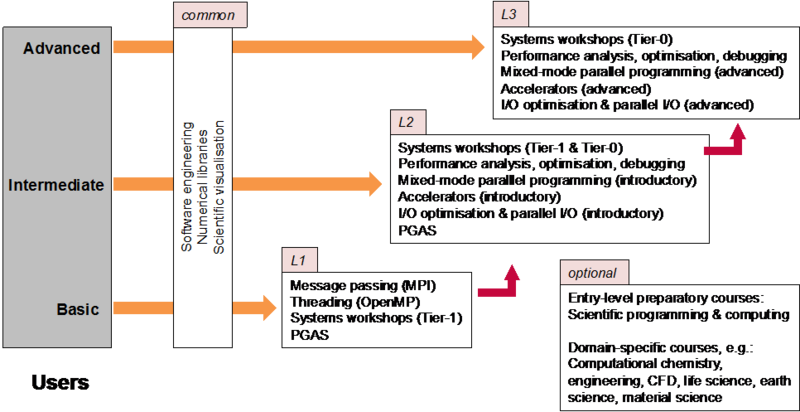Based on the PRACE Advanced Training Centre status and in cooperation with the rest of the PATC OMB members, we develop a European HPC professional training curriculum, available beyond the PRACE partnership. The curriculum is designed as a collaborative effort by the six PATC. The courses are designed to accommodate both specialists with HPC and Supercomputing background and user groups’ researchers using SC facilities.
The trainees can benefit from the hands-on sessions and communication with internationally renowned instructors. PATC courses are attended by specialists from across Europe and all lectures and materials are in English.

BSC trainers and their expertise
The fact that BSC has close relationship with the UPC and in particular the Barcelona School of Informatics creates a unique opportunity for trainees interested to continue their studies to take one of the post-graduate programmes on Master or PhD level that BSC is leading. It also means that our trainers have experience in undergraduate and postgraduate teaching and supervision, as well as curricula development, course and teaching materials design, which is an asset for PATC responsibility to develop, deliver and coordinate “ pan-European MSc and PhD programmes.
By using appropriate teaching methods which allow the incorporation of hands on practical exercises the training events develop understanding of the tools and environments functionality in the participants in an intensive fashion. The courses are between 1 and 5 days long. Through organizing the training events based on level of comprehension and marketing them across diverse communities we build them as meeting place for scientists of different disciplines, with similar level of capabilities thus intensifying the cross disciplinary collaboration.
Representative Sample of Topics on HPC related Training/ Teaching
|
Research Group |
Topics previously taught |
|
Computer Science Department |
Parallel computing and Supercomputing technologies , performance monitoring, debugging tools, processor architectures and programming models |
|
Applications Department |
parallelization, optimization and numerical simulations |
|
Life Sciences Department Earth Sciences Department |
Topics related to Computational Sciences and support of Scientists in the use of HPC in Life and Earth Sciences Applications |
|
Extreme Computing |
scalable parallel algorithms, optimisation methods and algorithms, mathematical modelling and Monte Carlo methods |
|
Storage Systems |
operating systems, middleware and high performance mass storage systems and parallel I/O |
|
Autonomic System & e-Business Platform |
operating systems, computer architectures and performance evaluation, interest in resource management of distributed and parallel cloud computing environment and multidisciplinary approach on sustainable green computing. |
|
Grid Computing and Clusters |
programming models for multicore and emerging architectures, StarSs, Cloud Computing and Grid Computing |
|
Heterogeneous Architectures |
microprocessor architecture, compiler optimisation, multi-threaded and vector architectures, power efficient supercomputing architectures, FPGAs |
|
Accelerators for HPC |
operating systems, CUDA, algorithmic Optimisation, Debugging |
|
Tools Group Manager |
performance analysis and tools, mainly Paraver and Dimemas. |
|
Parallel Programming Models |
computer networks, operating systems, micro-kernels and run-time libraries supporting parallel applications, parallel languages, compilers and operating systems |
|
Physical and Numerical Modelling |
Numerical Methods, Domain Decomposition techniques, next generation and adaptively, mathematical modelling of physical processes |
|
High Performance Computational Mechanics |
Computational Mechanics, Code performance analysis and algorithmic level code optimisation |
Team:
Director of PATC @BSC Maria Ribera Sancho
PATC Coordinator at BSC Nia Alexandrov
Contact Us:
patc [at] bsc [dot] es
education [at] bsc [dot] es
Sponsors:
All PATC courses are sponsored by BSC and the PRACE 3IP project.
If you want to learn more about PRACE Project, visit the website.
